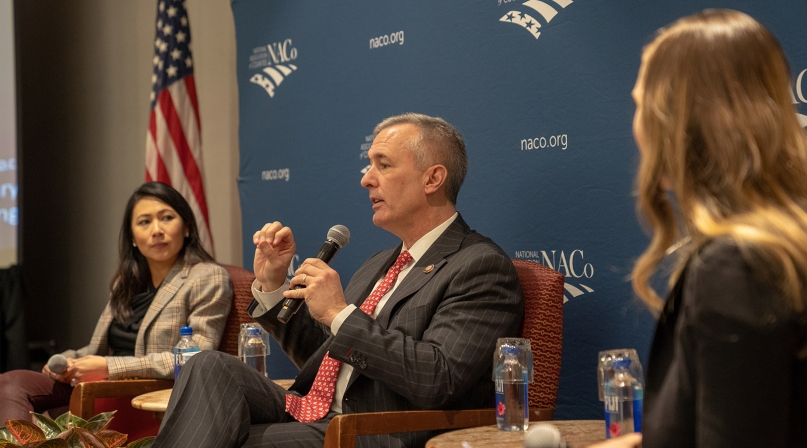Problem Solvers pitch bipartisanship

Key Takeaways
For public servants whose roles require them to act in a nonpartisan manner, county officials rarely have the luxury of having grand philosophical discussions about the direction of the policy they enact.
That’s something Rep. Stephanie Murphy (D-Fla.) sees in the position she has staked out in the U.S. House of Representatives.
“The vigorous debate of ideas is great for democracy, but it doesn’t have an impact on that person (at home), whatever their needs are in my community,” she said Jan. 10 to the National Council of County Association Executives (NCCAE) during its winter meeting in Washington, D.C.
She and Rep. John Katko (R-N.Y.), two members of the Problem Solvers Caucus of moderates in the House, explained how their group of 48 legislators hopes to keep the country moving.
“It’s like walking down the middle of the road,” in that you can be hit by cars going either direction, she said. Katko agreed and said that resisting the extreme wings of either party was crucial to crafting legislation palatable to both parties.
“I’m concerned about the rise of ‘vocalness’ of the far left and far right,” he said. “But you just have to know if we’re getting the crap beaten out of us by both, we’re doing something right.”
A divided Congress gives bipartisanship a chance, and an opportunity to enact long-lasting legislation.
“Whatever legislation we expect to make it into law has to be able to pass the Republican Senate and be signed by a Republican president,” Murphy said. “The only legislation that matters to my constituents’ lives are things that can become law.”
Katko goes as far as to not sponsor legislation that can’t find a Democrat to join him.
“Some people have been in Congress 10 years and they’ve had two or three bills passed in that time and they’re just ‘post office bills,’” he said. “They just don’t care about legislation. If you really care, it’s a really tough job because you have to reach across the aisle and it’s really hard in this day and age.”
Murphy, who has fought for a House rules change that will guarantee floor time to bills with significant bipartisan support, said that even when one party takes control, unilateral action is ill advised.
“When a bill becomes law with just one party’s support,” including 2017’s tax overhaul and the Affordable Care Act, “it introduces instability in the business community and the country because you just don’t know when the pendulum is going to swing back and the process to dismantle begins. The most effective way to craft this legislation is to find common ground and make it bipartisan.”
Katko said the stratification on Congress is making it harder to reach across the aisle. “For something like tax reform, passed with no Democratic votes, that’s not compromise,” he said, before acknowledging “I still voted for it, because I believe in it.”
Both represent congressional districts that are relatively evenly divided, keeping them on their toes and forcing them to be responsive to their constituents’ practical needs, rather than partisan rhetoric that gets airtime.
“It’s easy to talk about bipartisanship but hard to do,” Murphy sad. “It’s like a kindergarten playground,” sharing a swing. “When you’re in the minority, it’s easy to talk about bipartisanship, but when you’re in the majority,” things are different.
Kakto, who hadn’t planned to go into politics, keeps his career perspective in mind as he figures out his latest job in Congress and his competitive district.
“Quite frankly, in the end, you have to understand that you don’t have to have this job,” he said. “If you take a tough stance that costs you your job, then so be it. I had a life before this and I’ll have a life after.”

Attachments
Related News

U.S. House passes final minibus funding package
Congress introduced the final FY 2026 Appropriations package, including key county priorities related to transportation, housing, health, emergency management and public safety

U.S. Congress passes minibus funding package
U.S. House and Senate appropriators passed a “minibus” appropriations package containing Fiscal Year (FY) 2025 Interior-Environment, Commerce-Justice-Science and Energy-Water spending bills.

Federal district court issues ruling preventing the federal government from imposing immigration compliance mandates on grant recipients
On November 4, a federal judge in Rhode Island ruled that the U.S. Department of Transportation cannot condition federal grant funding on a recipient’s cooperation with federal immigration enforcement efforts.
